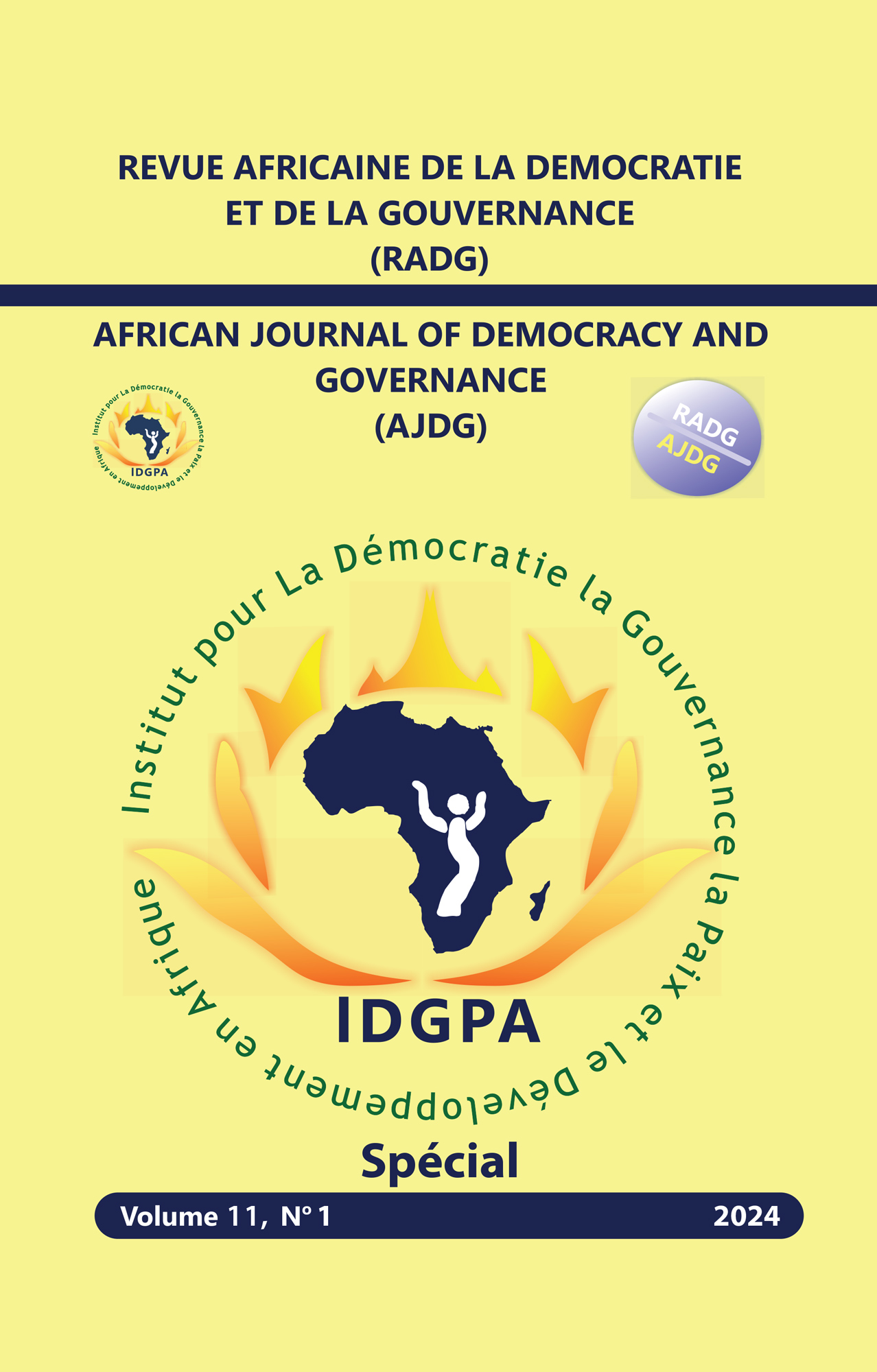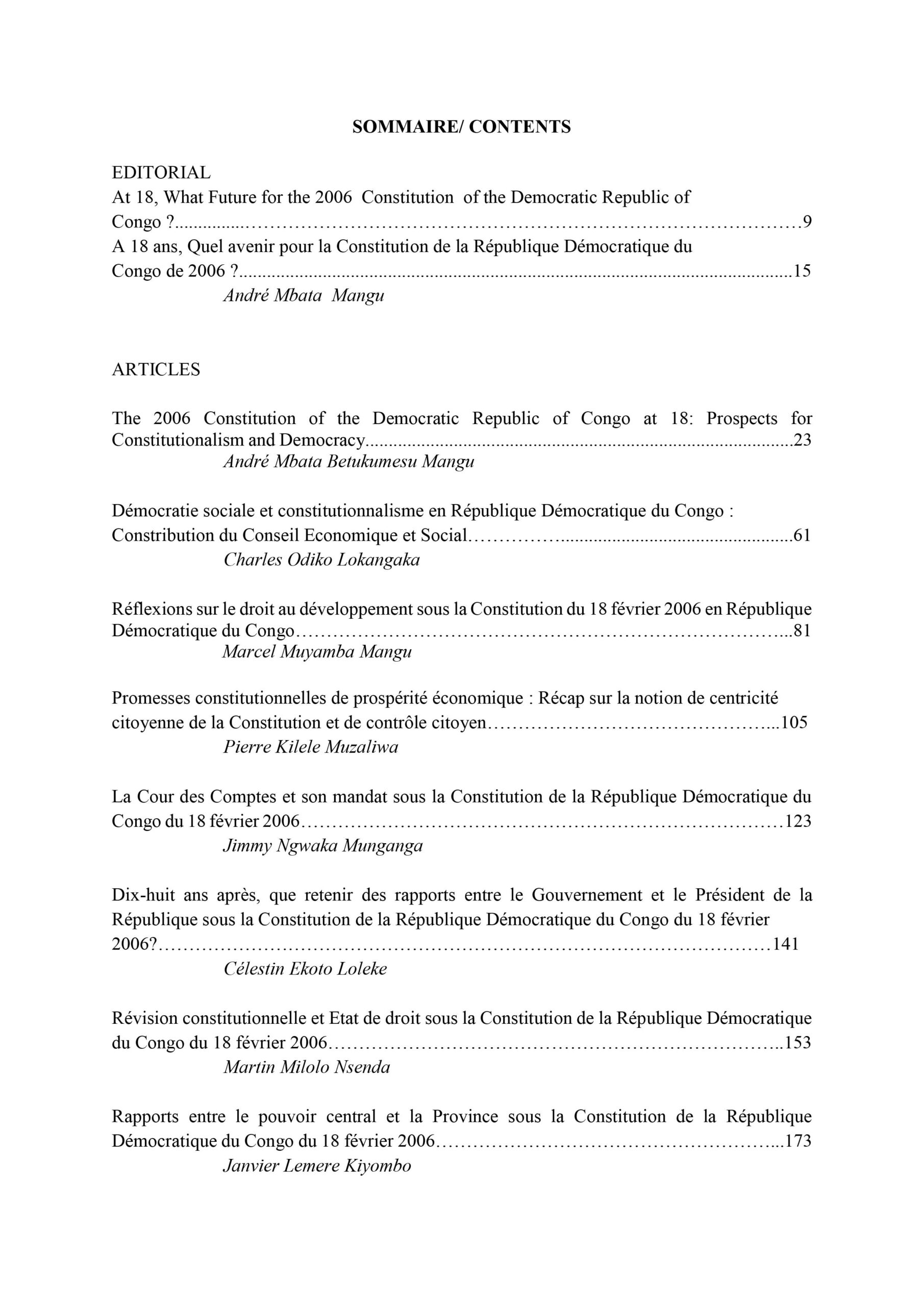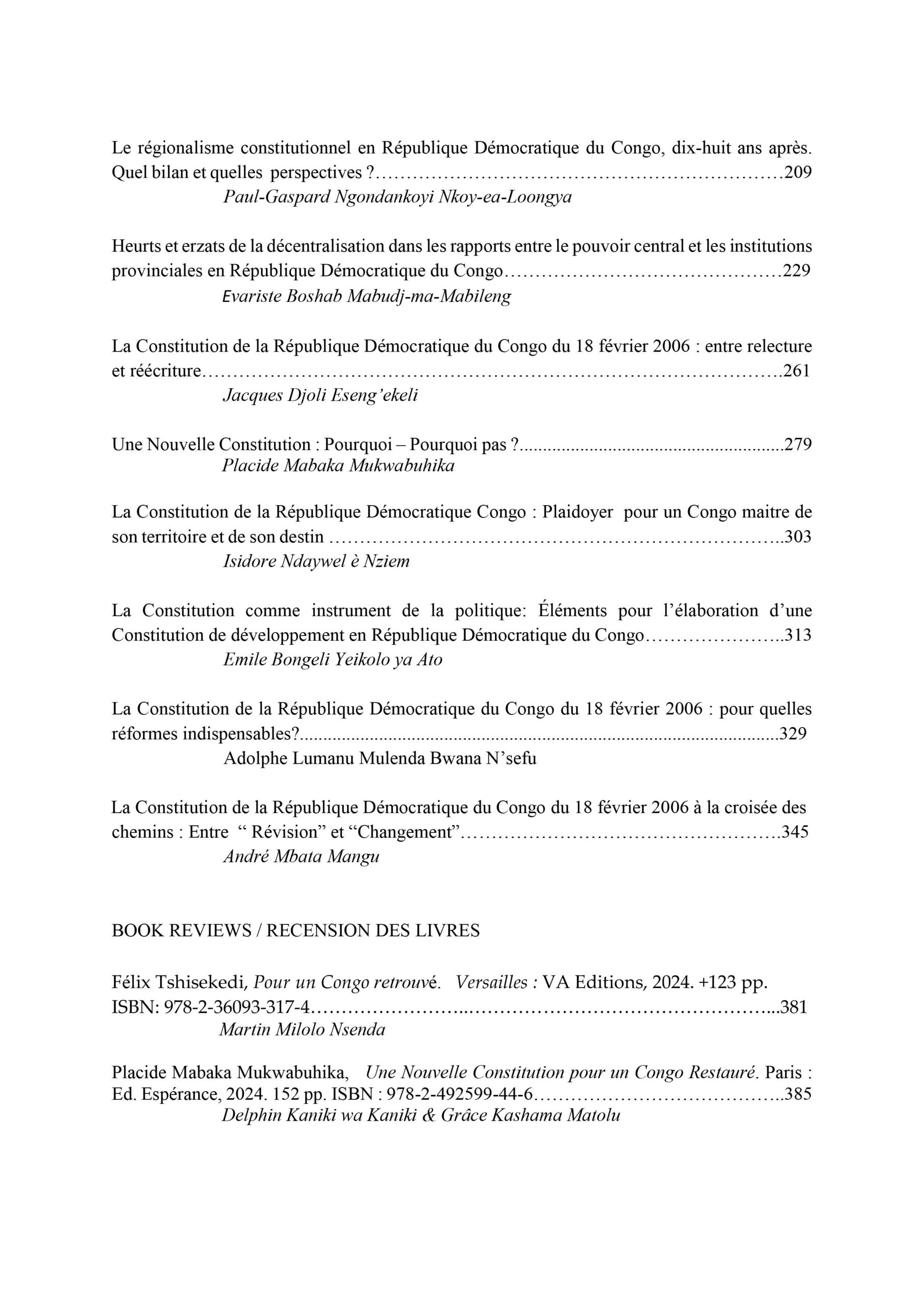La Constitution de la République Démocratique du Congo du 18 février 2006 à la croisée des chemins : Entre “Révision” et “Changement”
$ 10,00
André Mbata Mangu, Professeur Ordinaire, Faculté de Droit, Université de Kinshasa, République Démocratique du Congo & Extraordinary Professor, College of Law, University of South Africa, South Africa
Abstract
On 18 February 2024, the Constitution of the Democratic Republic of Congo (DRC) was 18 years old. Since its promulgation on 18 February 2006, it has been amended once only. The present article reflects on this Constitution, its place and its importance in the constitutional and political history of the DRC, on its past, its present and its future prospects. The author argues that no constitution is perfect or eternal. It can be modified. The Constitution provides itself for its amendment even though it remains silent on its replacement by another but complete change is impossible. The DRC Constitution of 18 February 2006 is at a crossroads: between “revision” and “change”? The author argues that the final say is with the people who are sovereign and who, in the name of the sovereignty and as the ultimate holder of the authority, may opt for a revision or a change. However, sovereignty belongs to the people who are recognised as the ultimate holder of state authority and sovereignty entitles them to adopt, amend, maintain, reinforce or suppress auto-limitation clauses or intangible provisions expressly excluding any revision for matters such as those listed in Article 220. Therefore, the Congolese people can opt for a constitutional amendment but they may also and should even opt for a constitutional change since a constitutional amendment as provided for by articles 218, 219 and 220 would not solve the problems raised by this Constitution.
Résumé
Le 18 février 2024, la Constitution de la République Démocratique du Congo (RDC) a atteint 18 ans d’existence. Depuis sa promulgation le 18 février 2006, elle n’a connu qu’une seule révision. Au moment où la RDC commémore le 18e anniversaire de sa Constitution, l’article se penche sur cette Constitution, sa place et son importance dans l’histoire constitutionnelle et politique de la RDC, son passé, son présent et ses perspectives d’avenir. L’auteur affirme qu’aucune constitution n’est parfaite ni éternelle. Elle peut être modifiée. La Constitution organise elle-même sa révision même si elle reste muette sur son remplacement par une autre, le changement total est impossible. La Constitution de la RDC du 18 février 2006 est à la croisée des chemins, entre « Révision » et « changement ». L’auteur soutient que le dernier mot revient au peuple qui est souverain et qui, au nom de la souveraineté et en tant que détenteur ultime du pouvoir, peut opter pour une révision ou pour un changement en revenant sur les mesures d’autolimitation ou dispositions dites intangibles. Le peuple congolais peut donc opter pour une révision constitutionnelle mais il peut aussi et devrait même opter pour un changement constitutionnel étant donné qu’une simple révision telle que prévue par les articles 218, 219 et 220 ne permettrait pas de résoudre les problèmes suscités par cette Constitution.
Mots-clés :Clauses intangibles ; Constitution ; Changement constitutionnel ; Démocratie ; Révision constitutionnelle ;
Description
Mbata Mangu, A. « La Constitution de la République Démocratique du Congo du 18 février 2006 à la croisée des chemins : Entre “Révision” et “Changement », African Journal of Democracy and Governance, Vol 11, No 1, 2024, pp 345-380
André Mbata Mangu, Professeur Ordinaire, Faculté de Droit, Université de Kinshasa, République Démocratique du Congo & Extraordinary Professor, College of Law, University of South Africa, South Africa
Abstract
On 18 February 2024, the Constitution of the Democratic Republic of Congo (DRC) was 18 years old. Since its promulgation on 18 February 2006, it has been amended once only. The present article reflects on this Constitution, its place and its importance in the constitutional and political history of the DRC, on its past, its present and its future prospects. The author argues that no constitution is perfect or eternal. It can be modified. The Constitution provides itself for its amendment even though it remains silent on its replacement by another but complete change is impossible. The DRC Constitution of 18 February 2006 is at a crossroads: between “revision” and “change”? The author argues that the final say is with the people who are sovereign and who, in the name of the sovereignty and as the ultimate holder of the authority, may opt for a revision or a change. However, sovereignty belongs to the people who are recognised as the ultimate holder of state authority and sovereignty entitles them to adopt, amend, maintain, reinforce or suppress auto-limitation clauses or intangible provisions expressly excluding any revision for matters such as those listed in Article 220. Therefore, the Congolese people can opt for a constitutional amendment but they may also and should even opt for a constitutional change since a constitutional amendment as provided for by articles 218, 219 and 220 would not solve the problems raised by this Constitution.
Résumé
Le 18 février 2024, la Constitution de la République Démocratique du Congo (RDC) a atteint 18 ans d’existence. Depuis sa promulgation le 18 février 2006, elle n’a connu qu’une seule révision. Au moment où la RDC commémore le 18e anniversaire de sa Constitution, l’article se penche sur cette Constitution, sa place et son importance dans l’histoire constitutionnelle et politique de la RDC, son passé, son présent et ses perspectives d’avenir. L’auteur affirme qu’aucune constitution n’est parfaite ni éternelle. Elle peut être modifiée. La Constitution organise elle-même sa révision même si elle reste muette sur son remplacement par une autre, le changement total est impossible. La Constitution de la RDC du 18 février 2006 est à la croisée des chemins, entre « Révision » et « changement ». L’auteur soutient que le dernier mot revient au peuple qui est souverain et qui, au nom de la souveraineté et en tant que détenteur ultime du pouvoir, peut opter pour une révision ou pour un changement en revenant sur les mesures d’autolimitation ou dispositions dites intangibles. Le peuple congolais peut donc opter pour une révision constitutionnelle mais il peut aussi et devrait même opter pour un changement constitutionnel étant donné qu’une simple révision telle que prévue par les articles 218, 219 et 220 ne permettrait pas de résoudre les problèmes suscités par cette Constitution.
Mots-clés: Clauses intangibles ; Constitution ; Changement constitutionnel ; Démocratie ; Révision constitutionnelle
Seuls les clients connectés ayant acheté ce produit ont la possibilité de laisser un avis.




Avis
Il n’y a pas encore d’avis.